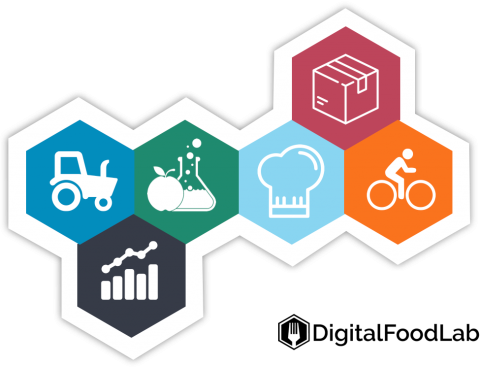FoodTech is an ecosystem made of all the agrifood entrepreneurs and startups (from production to distribution) innovating on the products, distribution, marketing or business model.
(French definition here)

Explore the 6 categories of FoodTech:
AgTech, Food science, Foodservice, Consumer tech, Delivery, Supply chain
![]() AgTech: startups disrupting agriculture. They come up with solutions to improve farming output and quality using drones, sensors and farm management software. AgTech is also about new farm products, next generation farms and urban farming.
AgTech: startups disrupting agriculture. They come up with solutions to improve farming output and quality using drones, sensors and farm management software. AgTech is also about new farm products, next generation farms and urban farming.
FARM MANAGEMENT
Startups assisting farmers in managing, organising and optimising all of the tasks on their farm, with data capturing devices or decision support software.
FARM ROBOTICS
Startups providing farmers with robots to replace or complement humans for challenging jobs.
INDOOR AND NOVEL FARMS
Startups developing urban and indoor farms to reduce the distance between production and consumption, increase yields, quality and sustainability.
AGRICULTURE MARKETPLACES
Startups working on B2B e-commerce marketplaces for farmers (with products ranging from seeds to equipment).
AG-BIOTECH
Startups innovating on living systems and organisms for agriculture (notably crops) and health.
ANIMAL FEED
Startups innovating on living systems and organisms for animal feed (usually with insects).
![]() Food science: startups developing new ingredients and food products.
Food science: startups developing new ingredients and food products.
ALTERNATIVE PROTEINS
Startups developing alternative proteins products or ingredients. They mostly work with plant-based, fermentation, and cellular agriculture ingredients.
CPG STARTUPS
Startups bringing incremental innovations on already well-established ingredients or markets. They differentiate through innovation in the product itself, the transparency of its composition, the means of distribution or greater customisation of the products.
DRINKS & BEVERAGES
Startups working on new forms of drinks, alcoholic or not, to promote new ingredients or a healthier lifestyle.
FUNCTIONAL INGREDIENTS
Startups developing new ingredients replacing additives, adding functionalities (such as reducing sugar), and improving the taste of food products.
PET FOOD
Startups developing animal feed intended for consumption by pets.
![]() Foodservice: startups reinventing the hospitality industry. They improve the management of out-of-home businesses today. They also create the conditions for the restaurant of the future with robotics and cloud kitchens.
Foodservice: startups reinventing the hospitality industry. They improve the management of out-of-home businesses today. They also create the conditions for the restaurant of the future with robotics and cloud kitchens.
RESERVATION PLATFORMS
Services to book a restaurant table, generally with discount. These startups can be generalists or be more specific (by targeting a food category or high-end restaurants).
FOODSERVICE MANAGEMENT
Services to improve restaurant management. They help restaurateurs improve operations from their online presence, marketing, customer feedback, procurement and inventory management to transparency.
PAYMENT SOLUTIONS (ePOS)
Services managing the point of sale of the restaurant, generally acting as a hub for other services connected to it.
VIRTUAL RESTAURANTS
Startups operating restaurant brands that are only available online. While most have a B2C business model through restaurant delivery platforms (or their own), others are B2B focused and act as virtual canteens.
FOODSERVICE ROBOTICS
Startups developing cooking robots to help or replace human tasks. This also includes 3D printers, automated kiosks and bartending robots.
CLOUD KITCHENS
Startups managing kitchens and renting them to other companies (often directly to virtual restaurants) to let them operate delivery operations.
![]() Consumer tech: startups developing services and devices to help consumer cook, identify the best foods for them and help them reach their personal goals.
Consumer tech: startups developing services and devices to help consumer cook, identify the best foods for them and help them reach their personal goals.
NUTRIGENOMICS
Startups developing services and devices that make sense of the consumers’ biomarkers (such as those included in the genome, microbiome and blood) to then make personalised recommendations on the foods they should consume or avoid.
RECOMMENDATION
Startups answering the questions “what should I eat (or drink)?” and “is that food good for me?”. They can offer recommendations of meals, recipes, shopping lists or wines based on each customer’s expectations.
RECIPES
Startups reinventing the recipe as we know it with new formats such as interactive games or addictive videos broadcast on social networks.
APPLIANCES AND COOKWARE
Startups developing a new generation of appliances or cookware. They provide more technology, new distribution channels or more personalisation.
FOOD EXPERIENCES
Startups creating tourist experiences around food-related point of interest (brewery, vineyard …) or reinventing access to cooking classes.
![]() Delivery: startups developing services to order and deliver groceries and meals.
Delivery: startups developing services to order and deliver groceries and meals.
MEAL KITS
Startups delivering regularly to their customers ingredients to make meals or ready-to-eat meals.
NEW RETAILERS
Startups developing grocery e-commerce platforms, including farm-to-home solutions and delivery from stores.
Q-COMMERCE
Startups operating dark stores (a small warehouse that is used exclusively for online deliveries) to bring groceries to consumers almost instantly.
RESTAURANT DELIVERY
Startups enabling their customers to order meals and get delivered from nearby restaurants.
DISCOVERY BOX
Delivery services to receive products selected by experts every month. Wine, tea, coffee and exotic new products from around the world are among the most popular themes.
DELIVERY ROBOTICS
Startups developing drones, robots and autonomous cars for food deliveries.
![]() Supply chain: startups developing solutions for the food supply chain and food retail industry, from digitalisation to automation.
Supply chain: startups developing solutions for the food supply chain and food retail industry, from digitalisation to automation.
SMART AND AUTONOMOUS STORES
Startups developing technologies that improve the in-shop consumer experience or make the store more or fully autonomous.
FOOD WASTE MANAGEMENT
Startups using data to avoid food waste either by managing prices or by creating the right connections with food banks or consumers.
DATA FOR SUPPLY CHAIN
Startups enabling food business all along the supply chain to create, access and share data on products. This data can be used internally, between business (for compliance and tracking) or with the consumers.

